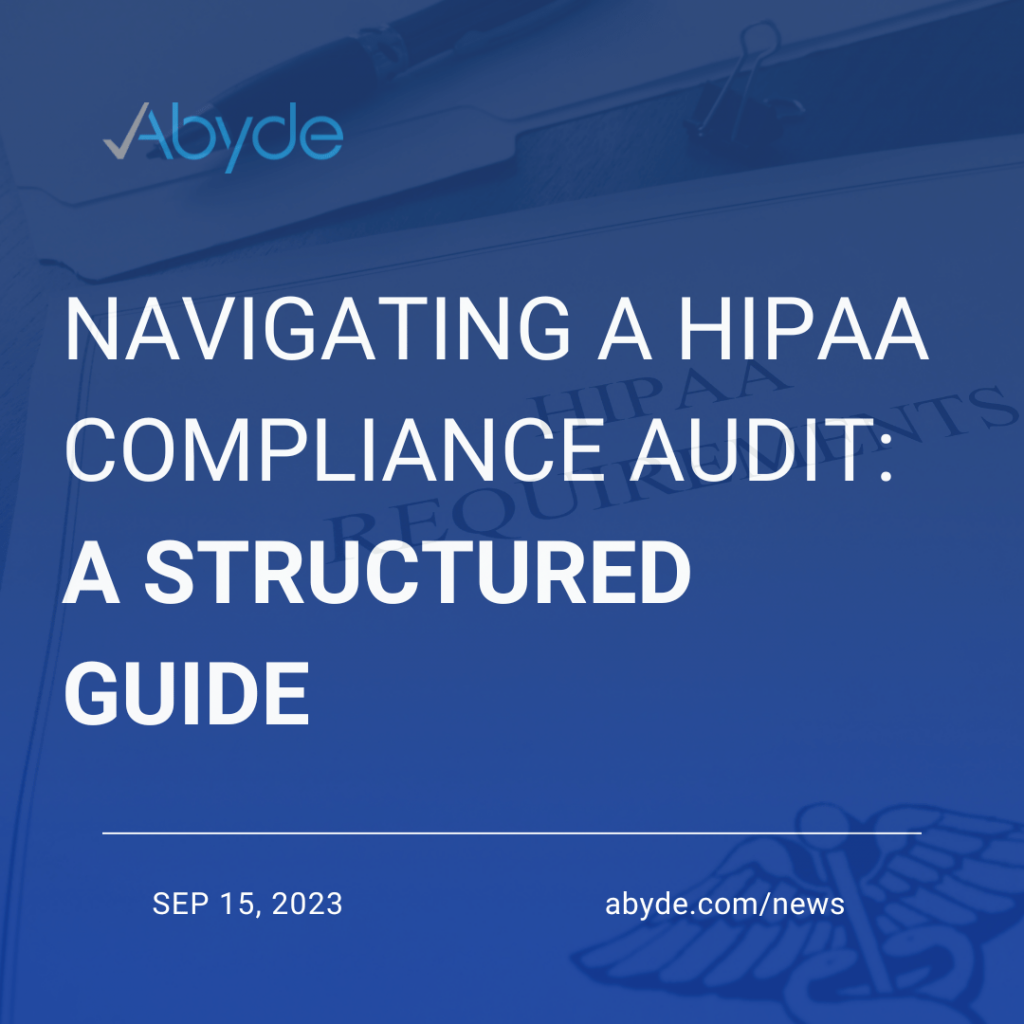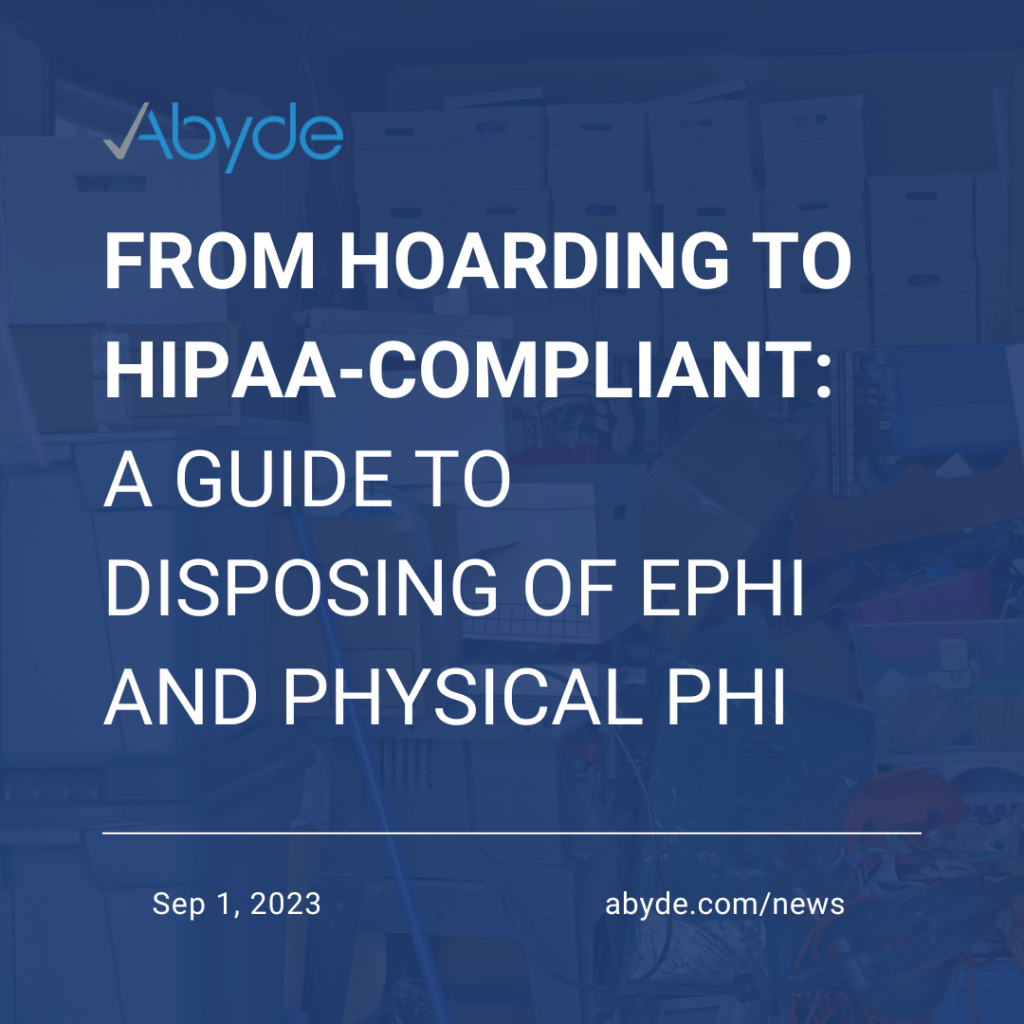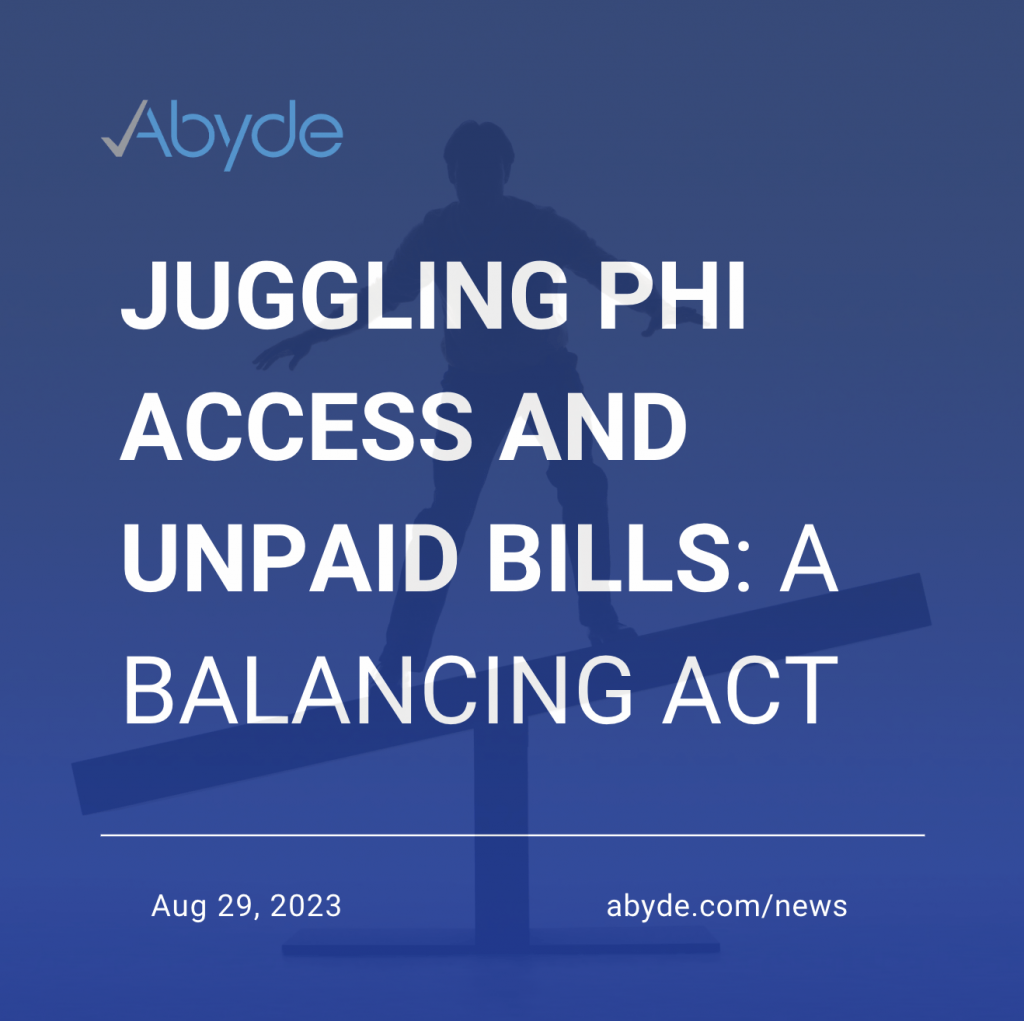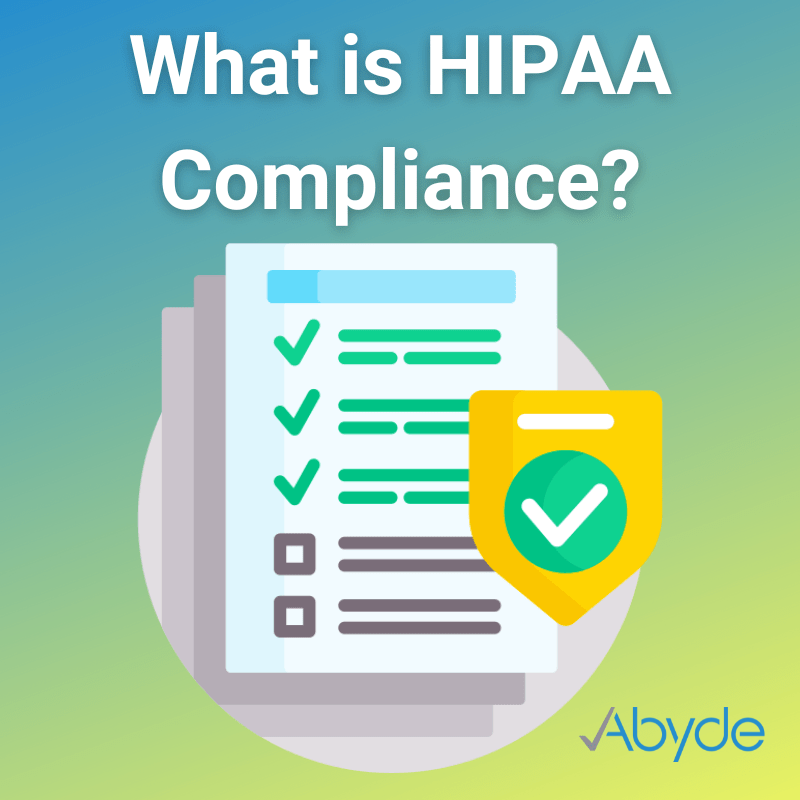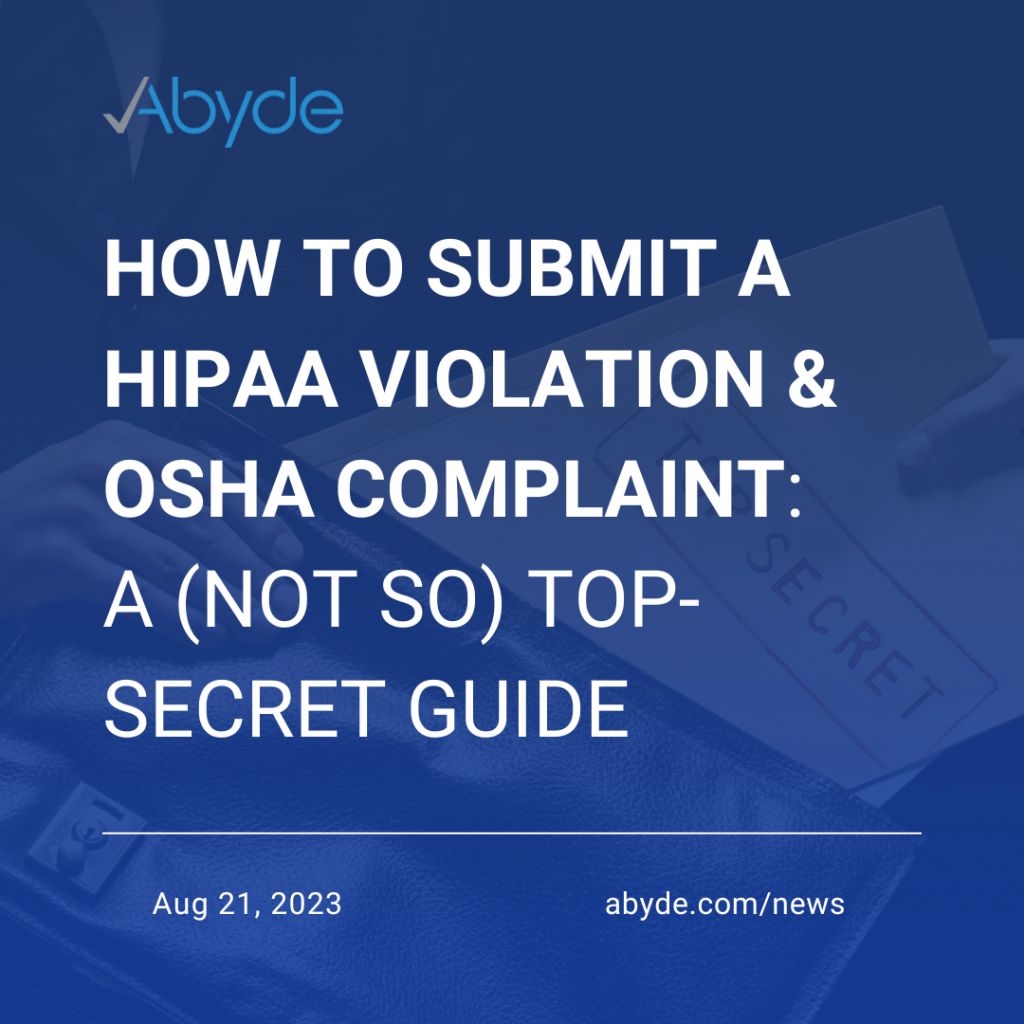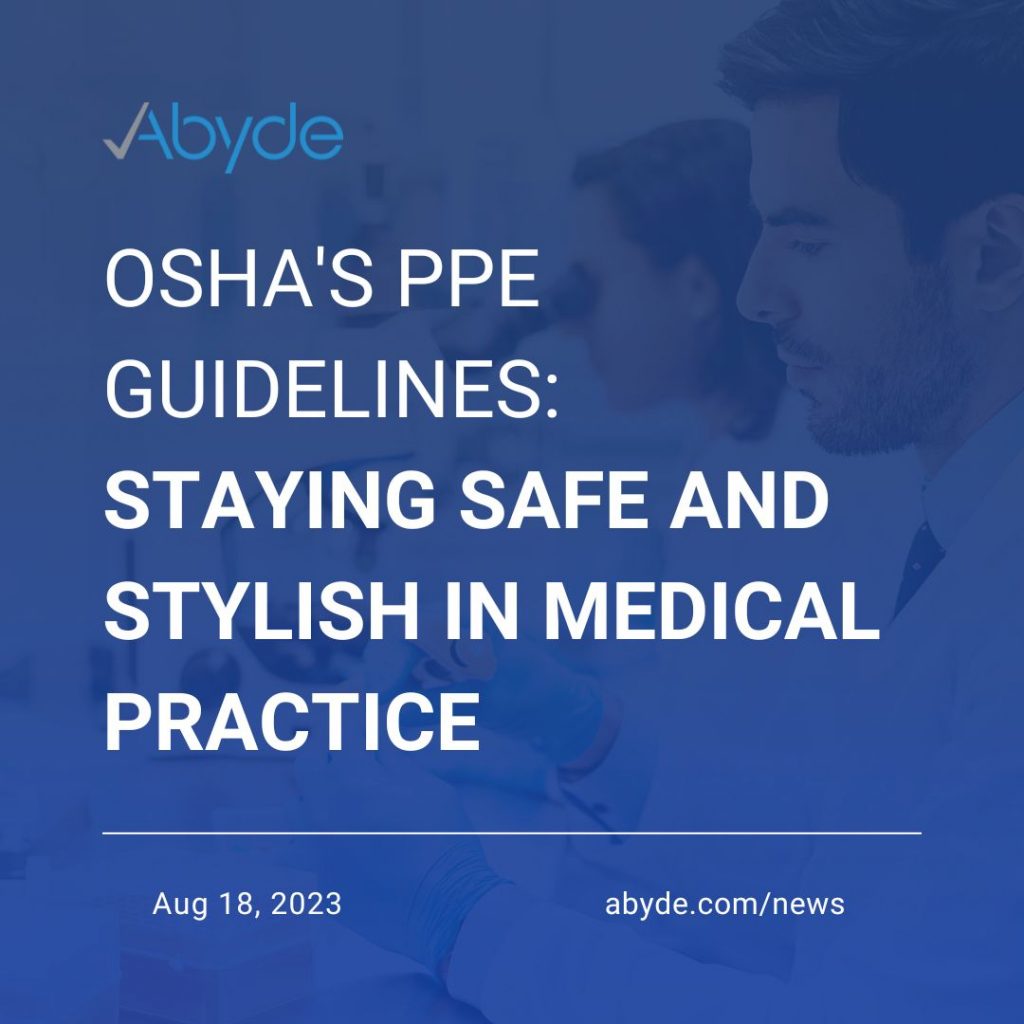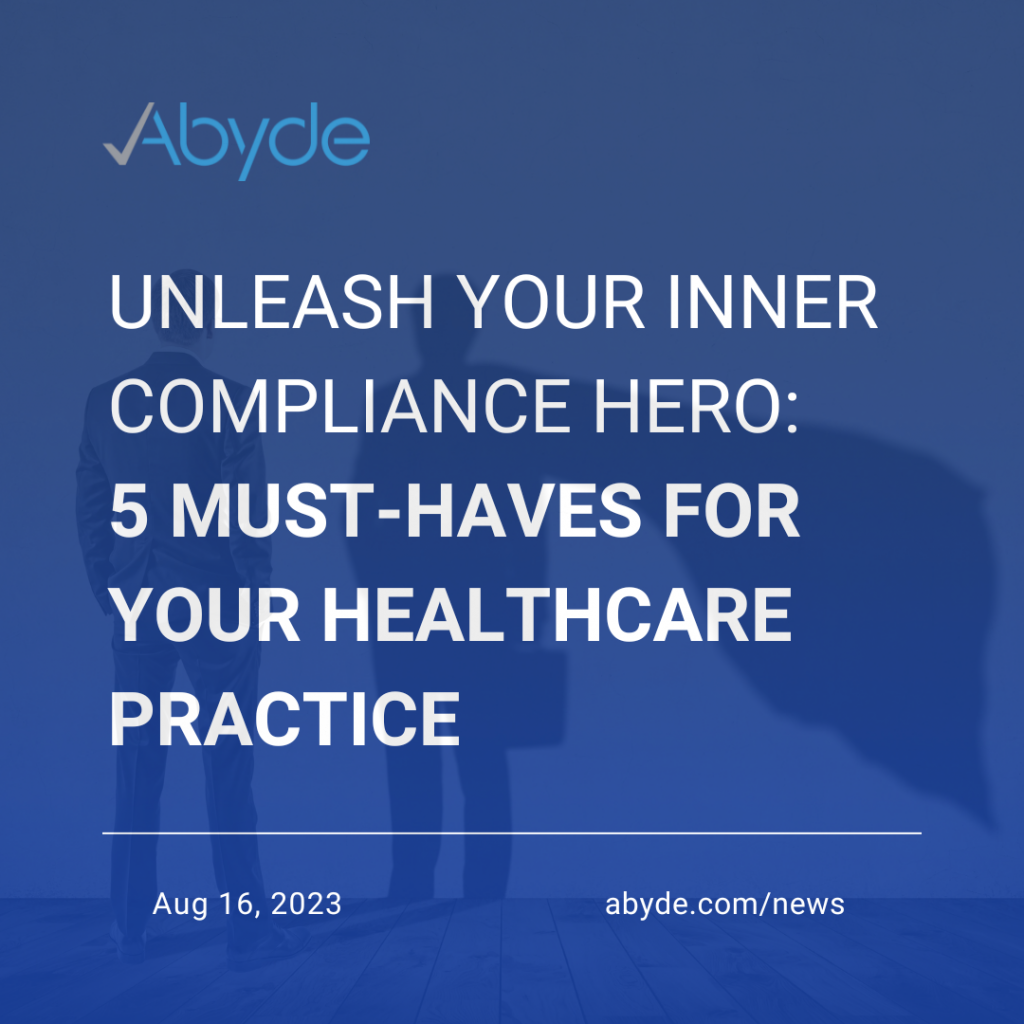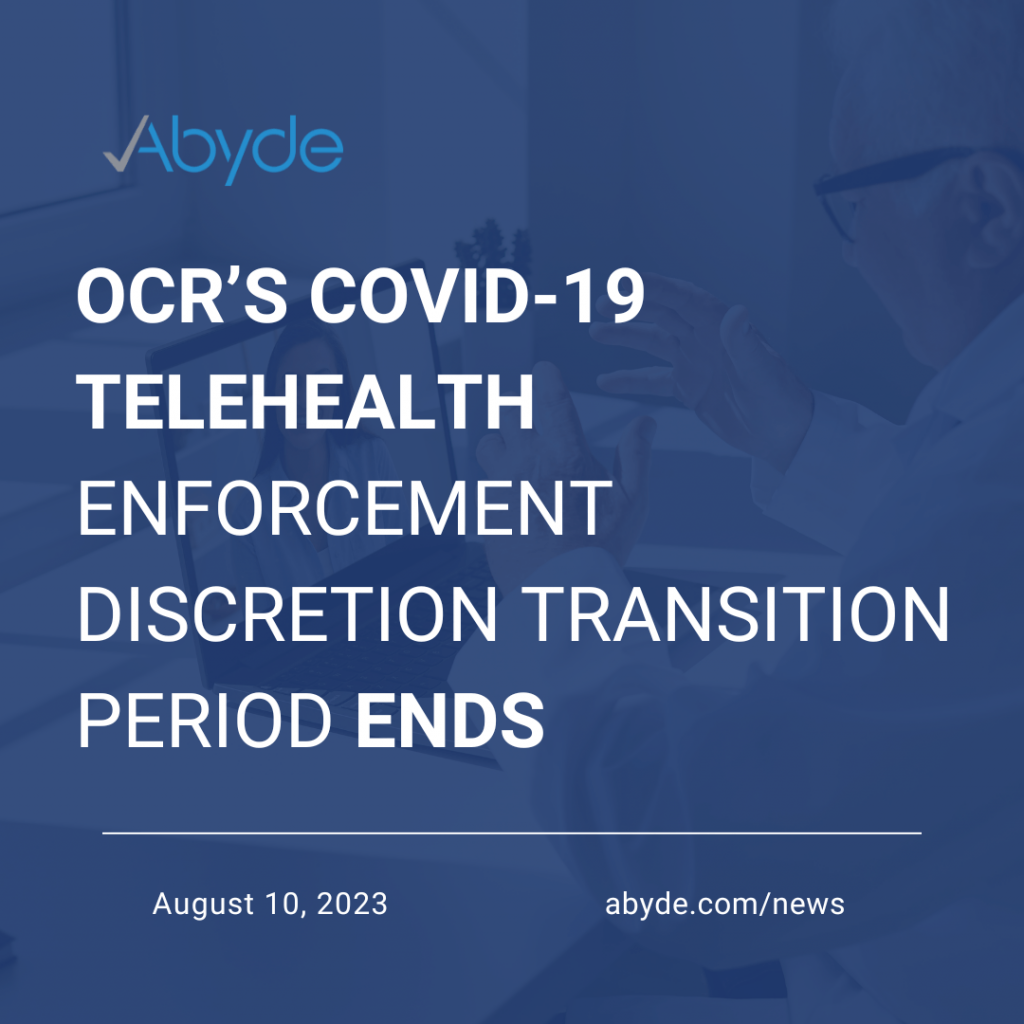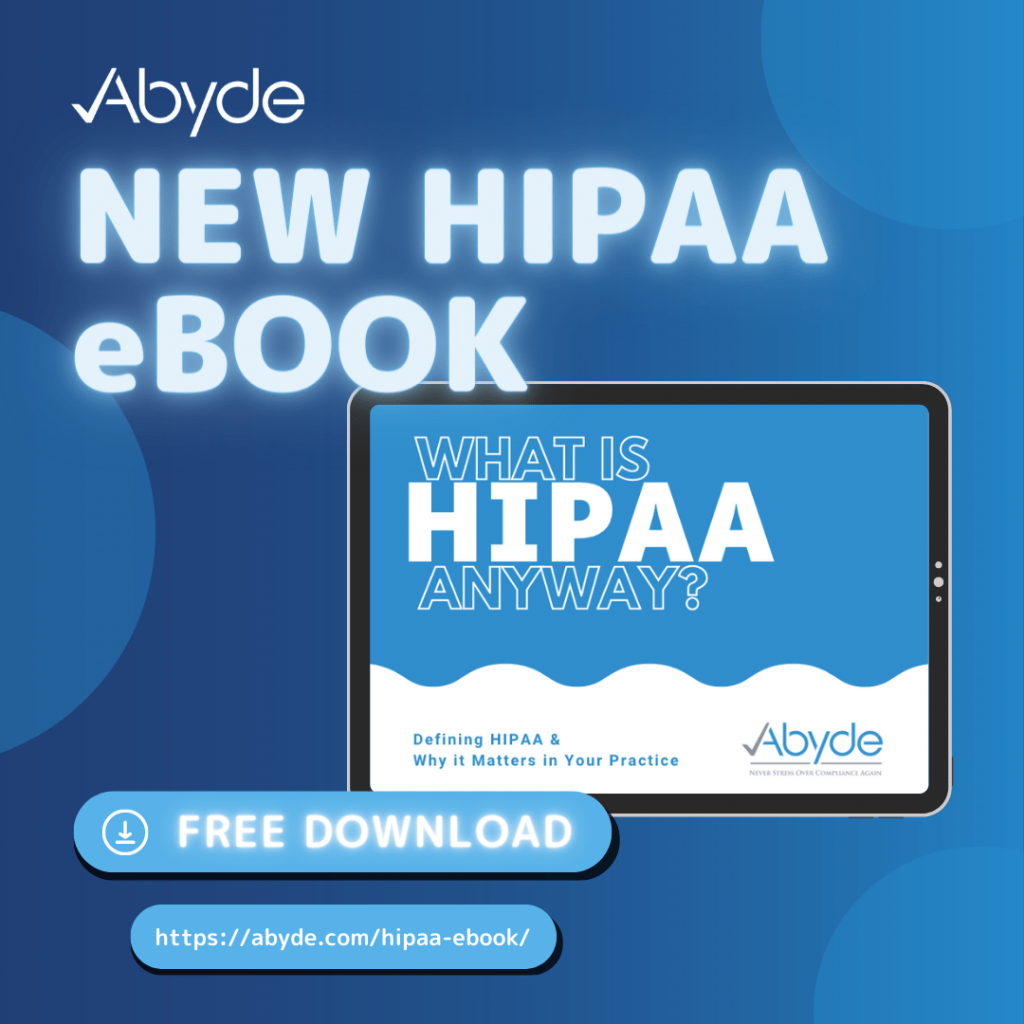September 15, 2023 Receiving notification of a pending HIPAA compliance audit may initially feel like an alarming event. Rest assured, it doesn’t need to be a distressing experience. Let’s put the jests aside and embark on a guided pathway to handling this with seriousness and diligence. Here’s how you can approach this situation methodically and with poise, assisted by Abyde’s comprehensive solutions: Step 1: Stay Calm and Mobilize Your Team Upon receiving the notification, resist the urge to panic. Instead, convene a team meeting to align your strategies and affirm that you can successfully navigate the audit with a coordinated effort. Step 2: Understanding the Audit Letter Deciphering the audit letter is paramount. Invest time in understanding the specifications mentioned in the letter to identify the areas that will be under scrutiny during the audit. Step 3: Engage Your Compliance Officer Your Compliance Officer will be the anchor during this period. Leverage their expertise to lead the preparation phase, focusing on gathering the necessary documents and aligning your operations with HIPAA standards. Step 4: Document Compilation Systematically compile all necessary documents including, but not limited to: Step 5: Conduct a Pre-Audit Before the official audit, conduct a pre-audit to identify any gaps in your compliance. This step ensures that you are well-prepared and confident for the audit day. Step 6: Be a Gracious Host On the audit day, maintain a cooperative and respectful demeanor toward the auditors. Offer refreshments and be willing to assist them throughout the process, facilitating a smoother audit experience. Step 7: Review and Improve Post-audit, take time to review the feedback provided in the auditor’s report. Utilize this information to make necessary amendments, showcasing your commitment to continuous improvement. Step 8: Continuous Compliance Recognize that maintaining compliance is an ongoing endeavor. Regularly update your policies and training to ensure that your practice operates within the stipulated regulations, fostering a culture of continuous compliance. Leveraging Abyde for Compliance Ease With Abyde by your side, you can transform this seemingly daunting task into a manageable one. Abyde offers: With preparation and the right partner like Abyde, you can face a HIPAA audit with confidence and tranquility. Embark on this compliance journey with seriousness and structured guidance, ensuring a successful outcome.
From Hoarding to HIPAA-Compliant: A Guide to Disposing of ePHI and Physical PHI
September 1, 2023 The TV show ‘Hoarders‘ showcases the struggles of individuals who have an extreme tendency to accumulate and hold on to items, sometimes to the point of causing harm or distress. In a medical practice, holding onto Protected Health Information (PHI) that is no longer needed may not only cause harm and distress but can also lead to severe legal penalties. The Health Insurance Portability and Accountability Act (HIPAA) mandates safeguarding PHI, including its proper disposal when no longer needed. This blog post will guide medical practices on how to dispose of electronic PHI (ePHI) and physical PHI in a HIPAA-compliant manner. Understanding ePHI and Physical PHI ePHI refers to any PHI that is created, received, maintained, or transmitted in electronic form. This includes information stored in electronic health records (EHR), electronic billing records, digital images, and any other electronic documents containing PHI. Physical PHI refers to any PHI that is in a physical form, such as paper records, printed images, and other tangible materials containing PHI. The Need for Proper Disposal Just as the individuals on ‘Hoarders’ need to declutter their living spaces to create a safer and healthier environment, medical practices need to dispose of ePHI and physical PHI that is no longer needed to create a safer and healthier environment for their patients’ information. Holding onto old and unnecessary PHI increases the risk of unauthorized access, identity theft, financial fraud, and reputational damage to the practice. HIPAA-Compliant Disposal Methods The HIPAA Privacy Rule requires covered entities to implement reasonable safeguards to limit incidental and avoid prohibited uses and disclosures of PHI, including in connection with its disposal. Additionally, the HIPAA Security Rule requires covered entities to implement policies and procedures to address the final disposition of ePHI and the hardware or electronic media on which it is stored. ePHI Disposal Methods Physical PHI Disposal Methods Proper disposal of ePHI and physical PHI is a crucial responsibility of medical practices, as HIPAA mandates. Failure to properly dispose of PHI can lead to unauthorized access, severe legal penalties, and reputational damage. Just as the individuals on ‘Hoarders’ must learn to let go of items that are no longer needed, medical practices must learn to let go of ePHI and physical PHI that is no longer needed and to do so in a HIPAA-compliant manner. Utilizing Abyde’s comprehensive HIPAA and OSHA Compliance SAAS solutions can help medical practices navigate these complex requirements effortlessly. By implementing and following proper disposal procedures—often simplified and clarified through Abyde’s automated systems—medical practices can create a safer and healthier environment for their patients’ information.
Juggling PHI Access and Unpaid Bills: A Balancing Act
August 29, 2023 Navigating the healthcare industry is like walking through a maze blindfolded, and one tricky corner that medical practices often stumble upon involves sharing Protected Health Information (PHI) with patients who still owe money. It’s a situation that demands a delicate balance between maintaining trust, sticking to the law, and keeping the practice financially afloat. So, how can practices manage this juggling act without dropping any balls? Decoding the Patient’s Rights First and foremost, let’s decode the cryptic world of patient rights. According to the Health Insurance Portability and Accountability Act (HIPAA), patients have the right to access their own PHI, even if they owe you enough money to buy a small island. In other words, withholding a patient’s PHI as a way to ‘encourage’ payment is a big no-no. Walking the Tightrope Maintaining financial sustainability while adhering to legal obligations is like walking a tightrope – one wrong move, and you’re in for a fall. While you can’t use PHI as leverage to extract payment, you can have a candid conversation about the outstanding balance when the patient requests their PHI. Just remember to keep your balance! The Importance of Crystal-Clear Policies Clear and well-communicated policies are the cornerstone of managing these tricky situations. Make sure your policies outline the process for requesting and sharing PHI and include information on billing and payment expectations. And don’t forget to train your staff on these policies – you don’t want anyone improvising in this high-stakes game! The Art of Communication Effective communication is key in any relationship, and the doctor-patient relationship is no exception. Be proactive in communicating with patients about their financial obligations and provide detailed billing statements that leave no room for confusion. After all, a well-informed patient is a happy patient! Embracing Technology In today’s digital age, technology is our best friend. Secure online portals can provide patients with easy access to their PHI while allowing them to view and pay their bills online. It’s a win-win situation! Sharing PHI with patients with an outstanding balance is a delicate dance that requires a fine balance between upholding patient rights, adhering to legal obligations, and maintaining financial sustainability. By implementing clear policies, mastering the art of communication, and embracing technology, practices can navigate these situations with grace and humor while maintaining patient trust. Abyde brings efficiency and organization to the compliance process. A user-friendly interface and intuitive tools make it easy for healthcare providers to navigate through the complexities of HIPAA and OSHA regulations. Automation capabilities save time by generating custom documentation, reminders for training, and conducting risk assessments. This streamlined approach allows healthcare organizations to allocate their resources more effectively, improving operational efficiency and smoother workflows. Contact one of our compliance experts today or schedule a demo here 🙂
HIPAA Compliance: What It Is, Who Must Comply, and Penalties for Non-Compliance
April 25, 2023 HIPAA (Health Insurance Portability and Accountability Act) is a set of regulatory standards introduced in 1996 to protect sensitive patient health information from being disclosed without consent. HIPAA compliance is following these standards to ensure that a patient’s personal health information (PHI) is protected and kept confidential. HIPAA regulations apply to various healthcare organizations, including doctors, hospitals, clinics, health insurers, and other covered entities. HIPAA compliance is not optional – it is a legal requirement for these entities to safeguard patients’ PHI, and failure to comply can result in severe penalties and fines. HIPAA regulations provide specific guidelines for handling patients’ PHI, including how it can be stored, transmitted, and accessed. Some of the critical requirements for HIPAA compliance include the following: Ensuring HIPAA compliance is essential for healthcare organizations to protect their patient’s PHI and avoid costly fines and legal repercussions. Covered entities must implement HIPAA-compliant policies and procedures, conduct regular risk assessments, and train employees on HIPAA regulations to ensure that PHI is always protected. Here are some common questions about HIPAA compliance: • Who must comply with HIPAA regulations? HIPAA regulations apply to covered entities, which include healthcare providers, health plans, and healthcare clearinghouses. Therefore, business associates with PHI access must also comply with HIPAA regulations on behalf of covered entities. • What is PHI? PHI stands for Personal Health Information and includes any information that can be used to identify an individual and relates to their health status or healthcare services. This includes medical records, billing information, and other identifying information. • What are the penalties for non-compliance with HIPAA regulations? The penalties for non-compliance with HIPAA regulations can be severe, ranging from fines of up to $50,000 per violation to criminal charges and imprisonment in extreme cases. Additionally, non-compliance can damage a healthcare organization’s reputation and erode patient trust. • What steps can healthcare organizations take to ensure HIPAA compliance? To ensure HIPAA compliance, healthcare organizations can take several steps, including conducting regular risk assessments, implementing security measures to protect ePHI, training employees on HIPAA regulations, and maintaining documentation of compliance efforts. • What is the process for reporting a HIPAA violation? If a healthcare organization discovers a potential HIPAA violation, it must investigate the incident and report it to the Department of Health and Human Services (HHS) Here are the common HIPAA violation-related trends: Please visit the OCR Website for more information here. There is a Solution Not to be our biggest fans, but Abyde for HIPAA and OSHA Compliance is so revolutionary that we can’t help it. There’s no software like it, and we feel our obligation as the industry leader is to keep setting the trend. That’s why we’re constantly implementing new features that make our software uniquely better. https://www.youtube.com/embed/qCeXt6gw7lI?feature=oembedAbyde Compliance Software In Summary HIPAA (Health Insurance Portability and Accountability Act) is a critical regulatory body that oversees healthcare practices in the United States. Compliance with HIPAA regulations is essential for healthcare practices, as violations can result in hefty fines and legal liabilities. Therefore, it is more beneficial for healthcare practices to use HIPAA compliance software to ensure they follow these regulations correctly. A HIPAA compliance software like Abyde can help healthcare practices easily manage and track compliance requirements, streamline processes, and reduce the risk of errors and omissions that can lead to non-compliance. By automating risk assessments, employee training, and documentation tasks, healthcare practices can ensure they fully comply with HIPAA regulations and avoid potential fines and violations. Moreover, HIPAA compliance software can also provide healthcare practices with tools to protect patient’s health information, such as secure messaging, access control, and encryption. These features can help to safeguard sensitive patient data and prevent breaches that can lead to HIPAA violations. Overall, HIPAA compliance software can provide healthcare practices with peace of mind, knowing they are doing everything possible to protect themselves and their patients from regulatory violations and the associated consequences. To book a demo with one of our Abyde specialists, click here or call us at (800) 594-0883
How to Submit a HIPAA Violation and OSHA Complaint: A (Not So) Top-Secret Guide
August 21, 2023 HIPAA and OSHA: two acronyms that sound like they could be distant cousins of R2-D2 from “Star Wars,” but they’re actually heavyweights in the worlds of healthcare and occupational safety. Brace yourselves as we venture into the exciting universe of privacy policies and safety protocols – with a side of sass! Reporting a HIPAA Violation – The “No Peeking Allowed” Rule HIPAA, not to be confused with a hippo or a new dance craze, is all about safeguarding your medical secrets. Here’s how you can report a violation in case someone’s trying to sneak a peek at your X-rays: Filing an OSHA Complaint – Because Safety First, Always If you’ve spotted something at work that screams, “I’m a hazard, come find me!” it’s time to put on your imaginary superhero cape and report an OSHA violation: Why It’s Important HIPAA OSHA Contact Information for Reporting Violations Got a pen and paper? Here’s where you send those pesky complaints: HIPAA’s Secret Keepers OSHA’s Safety Squad HIPAA and OSHA might not be the riveting dinner party conversation starters, but they know how to throw a compliance party. By following these (not so) top-secret instructions, you’ll be on your way to becoming a healthcare privacy hero or workplace safety wizard. So, the next time someone violates HIPAA or OSHA, remember: You’ve got the power (and this handy guide) to keep everyone straight and narrow! Note: If you need assistance with HIPAA compliance, tools like those offered by Abyde may be beneficial for healthcare providers in navigating the complex landscape of regulatory compliance. Always consult with legal professionals or compliance experts to ensure you follow the correct procedures for your situation.
OSHA’s PPE Guidelines: Staying Safe and Stylish in Medical Practice
August 18, 2023 In the world of healthcare, where white coats and scrubs reign supreme, OSHA is the unseen fashion designer, tailoring safety guidelines to ensure medical professionals stay safe and sound. But what’s this talk about PPE, and why doesn’t it come in neon colors? Let’s delve into OSHA’s PPE regulations and their impact on the medical field. What is PPE, and Can I Get It in Polka Dots? PPE, or Personal Protective Equipment, is the stylish array of safety gear healthcare workers don to keep themselves free from illness and injury. From gloves that wouldn’t grace a red carpet to masks that would never make a Met Gala, PPE might not be high fashion, but it’s a high priority! OSHA’s Runway Rules OSHA, the Occupational Safety and Health Administration, has laid down guidelines for PPE that medical professionals should follow, like the latest fashion trends. Here’s what’s strutting down the healthcare runway: Is PPE the New Couture? While PPE may never grace the pages of a fashion magazine, its role in the medical field is as critical as a little black dress in your wardrobe. OSHA’s guidelines ensure that medical professionals are protected and equipped to handle the dynamic world of healthcare. So the next time you don your gloves or adjust your face shield, remember that OSHA is the unseen stylist making sure you look good and stay safe. After all, in the world of medicine, safety is always in vogue.
Unleash Your Inner Compliance Hero: 5 Must-Haves for Your Healthcare Practice
August 16, 2023 Greetings, mighty guardians of healthcare excellence! Amidst your battles against the forces of illness and ailment, another battlefield requires your attention – the realm of compliance. Fret not; we are here to guide you with a touch of heroism and a sprinkle of wit. Join us as we unveil the essential tools every compliance hero needs to conquer the challenges of HIPAA and OSHA. Prepare to wield these mighty weapons and pave your way to triumphant healthcare success! 1. Risk Assessment: Unmasking the Vulnerabilities Imagine your practice as a fortress, where every room holds a secret passage. Two crucial risk assessments must be your trusty maps to ensure your stronghold is impenetrable. First, dive into HIPAA’s Security Risk Analysis requirement, which is like using a magnifying glass to examine every nook and cranny of your digital kingdom. Identify potential data breaches, shore up weak spots in your electronic walls, and ensure your patients’ information remains untouchable. Second, take a cue from OSHA’s Facility Risk Assessment recommendation – it’s the blueprint for your physical realm. Uncover hazards lurking in plain sight, from slippery floors to sneaky cords. Patch up the weak points, ensuring your practice is compliant but also safe and secure. Remember, while villains might seek out vulnerabilities, you’ll be miles ahead, anticipating their every move with a comprehensive risk assessment strategy! 2. Training for Doctors and Staff: Superheroes in the Making Training sessions might sound as fun as watching paint dry, but trust us, they’re your secret weapon! Educating your doctors and staff on compliance procedures is like giving them the power to stay out of trouble. Plus, it’s an opportunity to turn training into a game. Who can spot the most compliance loopholes? The winner gets bragging rights and an extra cookie at lunch! 3. Specific Policies, Procedures, and Forms: The Rulebook of Heroes Every superhero needs a rulebook, and for your practice, it’s your specific policies, procedures, and forms. These are like your superhero code – the guidelines that keep everyone on the right track. Make them crystal clear, so even the busiest doctor can understand them. And remember, humor is welcome here, too – “Please don’t leave confidential papers in the coffee machine” might just make someone’s day. 4. You wouldn’t invite a dubious character into your lair, right? Vendors are your practice’s allies, but only when you rigorously evaluate them. Think of them as potential sidekicks in your compliance journey. Ensure they’re well-intentioned and legally bound to keep your secrets. That’s where HIPAA’s Business Associate Agreements swoop in, forming the superhero pact that safeguards your patients’ data. But wait, there’s more! Just like any tag team, you share responsibility. OSHA’s Joint Responsibility requirement insists that your vendors are as committed to physical safety as you are. So, when inviting vendors to your “Compliance Hero Squad,” make sure they’re not just capes and masks but true partners who stand by you through thick and thin. 5. Expert Support: The Batphone of Compliance Even Batman needs Alfred, right? Expert support on speed dial can save the day when the compliance waters get murky. Whether it’s a sudden policy change or deciphering complex regulations, these experts are like your trusty sidekicks. Think of them as the Batphone of compliance – always ready to guide you out of a tight spot! Conclusion: And there you have it, valiant healthcare defenders – the Fabulous Five tools to fortify your independent practice against the storms of compliance challenges. But hold tight, brave souls, for compliance needn’t be a gloomy ordeal. Sprinkle in a dash of wit, a dose of creativity, and wrap it all up with the indomitable spirit of a superhero. You’ll conquer even the mightiest of regulatory dragons with an infectious grin. Stay vigilant, stand tall in compliance glory, and let those healing vibes radiate far and wide! But before you start to fret about draining your coffers or deciphering the enigmatic tongues of HIPAA and OSHA, fear not! Enter Abyde, the ultimate weapon in your arsenal. Our cutting-edge software solutions are designed to make the above (and beyond) a breeze, letting you return to your noble quest of patient care and prosperity. Reach out to our experts, and witness firsthand how compliance becomes as easy as donning a superhero cape!
OCR’s COVID-19 Telehealth Enforcement Discretion Transition Period Ends
August 10, 2023 OCR is Turning Up the Heat as their Telehealth Enforcement Discretion is Sizzling Out! Ah, the sweet heat of summer! That particular time when our ice creams seem to have a faster meltdown than our resolutions of getting that “beach body” (for the third year in a row). Speaking of melting, there’s a hot update simmering in the healthcare compliance oven: the OCR’s telehealth enforcement discretion transition period is officially sunsetting. But before you start sweating more than after a midday August jog, let’s fan ourselves with the facts. What’s Cooking? During the pandemic’s peak, the OCR graciously set our minds (and compliance teams) at ease with a relaxed telehealth enforcement period. Because of the implications of the Public Health Emergency, the government loosened the restrictions on telehealth applications to ensure that patients were still receiving the necessary care needed in a practical manner. Unfortunately, like most summer love stories, the enforcement discretion had to come to an end. How Can You Protect From Getting Burned? The sun might be blazing outside, but you don’t have to get scorched. Here’s a simple telehealth-protection formula:
What is HIPAA, Anyway? Abyde’s HIPAA eBook Defines HIPAA & Why it Matters in Your Practice
August 1, 2023 Navigating the complexities of HIPAA compliance can be overwhelming, especially when you have numerous other pressing concerns in your field. As healthcare professionals, you might be familiar with HIPAA, but it’s understandable that it’s not always at the top of your priority list. However, ensuring compliance with HIPAA is crucial to safeguarding patient privacy, protecting sensitive data, and avoiding potential scrutiny from government audits. In response to the need for a practical and concise approach to HIPAA compliance, Abyde created our own one-of-a-kind HIPAA eBook. This convenient reference aims to provide your practice with a comprehensive yet easy-to-follow overview of HIPAA’s role in your field, empowering you to confidently address compliance challenges without being weighed down by complex regulatory jargon. This eBook starts by demystifying HIPAA, offering a clear overview of its relevance in your specific healthcare field. Whether you run a medical practice, dental clinic, or any other healthcare facility, this guide tailors the information to your unique needs, making it easier to understand the specific requirements that apply to your practice. We recognize your busy schedule, so the eBook streamlines the essential steps to achieve HIPAA compliance. It breaks down the Privacy Rule and Security Rule into manageable segments, providing practical insights and real-life examples relevant to your daily operations, and offers a simplified approach to conducting a risk assessment. It guides you through identifying potential weaknesses in your data handling processes, allowing you to proactively address security gaps and minimize the risk of data breaches. Electronic Protected Health Information (ePHI) is prevalent in modern healthcare practices, necessitating robust data security measures. Abyde’s eBook also emphasizes the importance of safeguarding ePHI and provides expert recommendations on encryption, secure data transmission, and strong password policies. While the intricacies of HIPAA compliance might not be your primary focus, ensuring your practice adheres to these regulations is paramount for patient trust, data security, and legal protection. Abyde’s free HIPAA eBook offers the perfect solution, providing a concise and comprehensive overview of HIPAA’s role in your field. Download your HIPAA eBook today!
SR-Hey, Have You Conducted a Security Risk Analysis?
July 28, 2023 In the ever-evolving landscape of healthcare, the safeguarding of sensitive patient information is of paramount importance. To protect patient privacy and maintain health data integrity, the Health Insurance Portability and Accountability Act (HIPAA) sets stringent standards for compliance. One of the vital components in achieving HIPAA compliance is conducting Security Risk Analyses (SRAs). Understanding HIPAA and its Compliance Requirements HIPAA, enacted in 1996, is a landmark piece of legislation designed to protect the privacy and security of patients’ health information. The regulation establishes a set of rules that healthcare providers, health plans, and other covered entities must follow to ensure the confidentiality and integrity of patients’ protected health information (PHI). Failure to comply with HIPAA can lead to severe consequences, including hefty fines and reputational damage. But we all knew that, right? What is a Security Risk Analysis (SRA)? Now this is what we need to know! A Security Risk Analysis systematically evaluates an organization’s information technology infrastructure, policies, and procedures to identify potential vulnerabilities and risks to the confidentiality, integrity, and availability of PHI. An SRA aims to assess the organization’s current security measures, identify weaknesses, and implement necessary safeguards to mitigate risks effectively. Why is an SRA Important for HIPAA Compliance? Identifying Vulnerabilities: An SRA helps healthcare organizations identify potential vulnerabilities in their systems and processes that could lead to unauthorized access or disclosure of PHI. By understanding these weaknesses, organizations can take proactive measures to address them before any security breach occurs. Preventing Data Breaches: Data breaches in healthcare can expose sensitive patient information, leading to significant legal and financial consequences. Conducting an SRA helps preemptively prevent data breaches by bolstering security measures and ensuring compliance with HIPAA’s Security Rule. Mitigating Risks: Risks in healthcare are constantly evolving due to new cybersecurity threats and technological advancements. Regular SRAs allow organizations to stay ahead of potential risks and adopt measures to mitigate them effectively. Tailoring Security Measures: Each healthcare organization has unique systems and processes. An SRA helps identify specific security needs and allows the organization to tailor security measures to address its individual risks effectively. Demonstrating Compliance: HIPAA compliance requires organizations to conduct regular SRAs. By documenting assessments, organizations can demonstrate their commitment to safeguarding patient data, which is essential during audits and investigations. Improving Security Posture: SRAs are not just a checkbox exercise; they provide valuable insights into the organization’s overall security posture. Based on the analysis results, organizations can continually implement improvements to enhance their security measures. Legal and Reputational Protection: A data breach can tarnish an organization’s reputation and erode patient trust. By conducting SRAs and implementing robust security measures, healthcare entities can enhance their legal and reputational protection. At Abyde, we take a distinctive approach to SRAs by offering a personalized and tailored experience for you and your practice. Think of our SRA module as your dedicated companion, guiding you through the process of identifying vulnerabilities specific to your practice. Recognizing that each practice is unique, our intuitive software will present only the questions relevant to your business as you respond. This streamlined approach is one of the many ways we ensure simplicity and effectiveness in achieving your compliance goals. The protection of patient data is not only a legal obligation but also an ethical responsibility for healthcare organizations. HIPAA compliance is critical in ensuring that patient information remains secure and confidential. Regular SRAs are an indispensable aspect of HIPAA compliance, allowing organizations to identify vulnerabilities, prevent data breaches, and mitigate risks effectively. By investing in security measures and staying proactive in their approach, healthcare organizations can reinforce patient trust and safeguard the integrity of their services in today’s increasingly digital healthcare landscape.
